Looking for a natural way to find relief from the hectic pace and demands of the modern world?
Gardeners have known for centuries that tending a plot is good for your physical health, and that it improves mood and dissolves stress. Now, research is providing us with the science that supports our intuitive understanding of soil salvation!
Elemental and natural, time spent gardening can calm the mind, sooth ragged emotions, and increase our ability to focus on the positive aspects of our lives.
The size and scope of the allotment isn’t important.
No previous experience or specialized training is needed. And only a few basic tools and supplies are required to reap the many rich rewards.
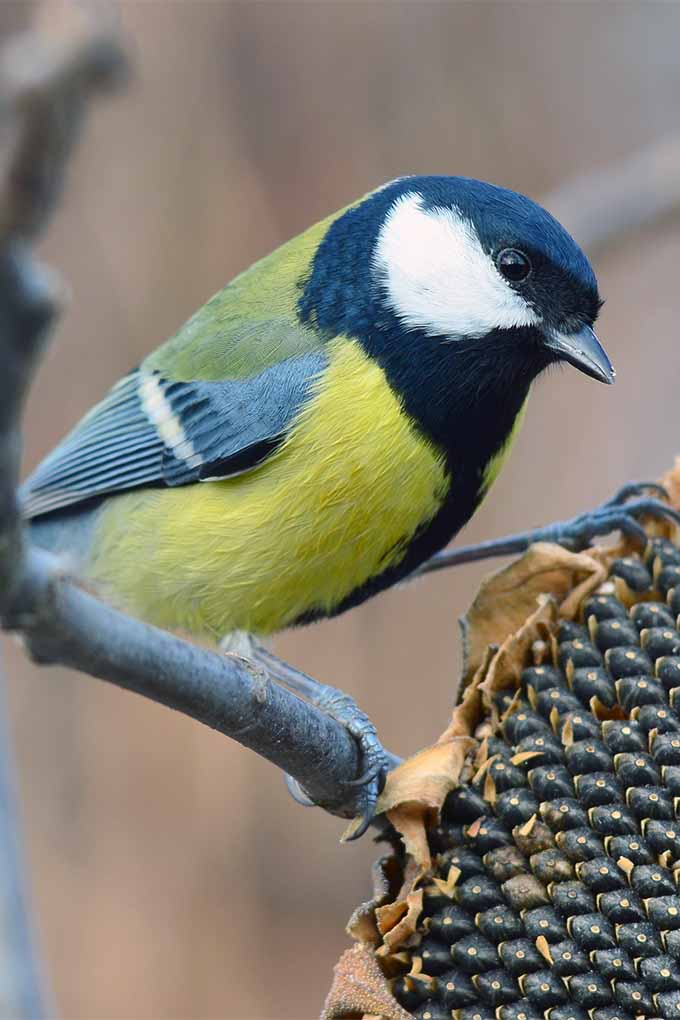
And as we’ll discover below, with our current germ-eradicating habits and being plugged in 24/7, we need the restorative antidote of reconnecting with nature now more than ever.
Let’s look at a few of the explanations as to why gardening provides us with stress relief, and touch on a few tips that reveal how to sow the seeds of a healthy body, relaxed mind, and happy heart!
No Rules Allowed
Please take out your Gardeners’ Operations Manual and turn to the section on Rules and Regulations. Under Section 14, Subsection xii, direct your attention to Rule 62 and repeat out loud: “No rules allowed.”
(And if you took that seriously, it’s a pretty good indication you’re in need of soil salvation!)
But really, it’s important to understand that gardening is only a hobby – albeit a productive one on many levels. Certainly, there are other hobbies that provide relaxation, but few offer the ease of participation that tending a bit of soil does.
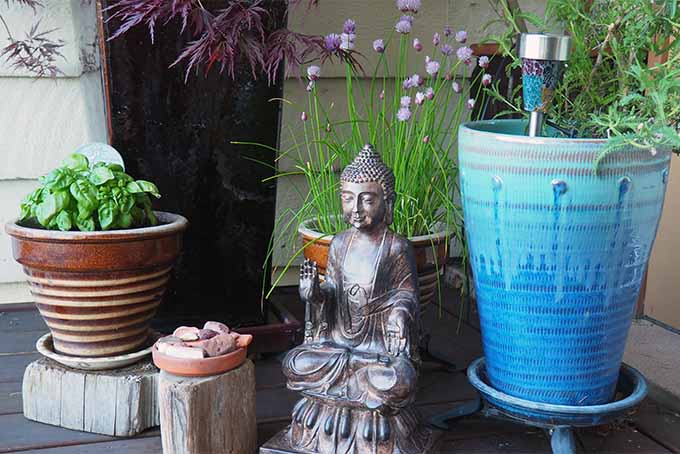
Unlike sports, there are no regulations for fair play or penalties for the cheaters.
You won’t have to buy specialized shoes (not that anybody’s stopping you) or protective gear (well, maybe a pair of gloves), and no uniform or brand endorsement is required. In fact, grubby old clothes are the de rigueur ensemble!
And unlike trendy takes on ancient practices like yoga, there are no new age versions of sowing and reaping – nor any pencil-thin instructors sweetly reprimanding you about your inadequate technique.
Neither is tending a plot a chore. There are no deadlines, no one will grade you, and there are no standards to be upheld. (Unless of course, it’s your Mother’s… but that’s a different story!)
It’s your little bit of dirt, to tend as you like.
However, if you want to produce more than weeds, it will require a certain amount of time and energy to produce flowers, veggies, and fruit.
So it is important to give some thought to how much effort you’re willing to invest, then plan your plot accordingly.
A common error for newbies is to start too big, and then become overwhelmed.
If you just want to putter with a couple of flower pots, tilling and sowing the back 40 when you already work a 14-hour day will just lead to more stress!
If you’re not sure about your requirements, this article has the guidelines you need for planning and planting your first garden.
The Big Mystery
Mystery, or fascination with processes such as the evolution of nature, can draw and engage our attention in both involuntary and voluntary ways – providing us with a valuable coping tool.
In environments that promote stress, it’s easy to become self-absorbed and fixate on problems, which can lead to depression and feelings of inadequacy or diminishment.

Even the simple act of viewing pictures of vegetation, or gazing from a window on a natural setting, helps to increase positive feelings and decrease stressful emotions!
When we engage with the garden, it holds our attention, which helps to assuage feelings of anger, fear, and sadness, and promote a healthier physiology. It does this by interrupting and breaking the cycle of rumination, which can reveal a refreshing “bigger picture” perspective.
One study found that this fascination aspect improved depression severity during and immediately after a 12-week study period – with significant improvement still evident three months after the study concluded.
Stop and Smell the Roses
To get the most out of the de-stressing atmosphere of your time with nature, disconnect and slow down.
Numerous areas of medical study report that multitasking makes us less efficient. And an increasing number of studies show that the heavy use of technology, like mobile phones, can lead to sleep interruption and increased levels of depression and stress.
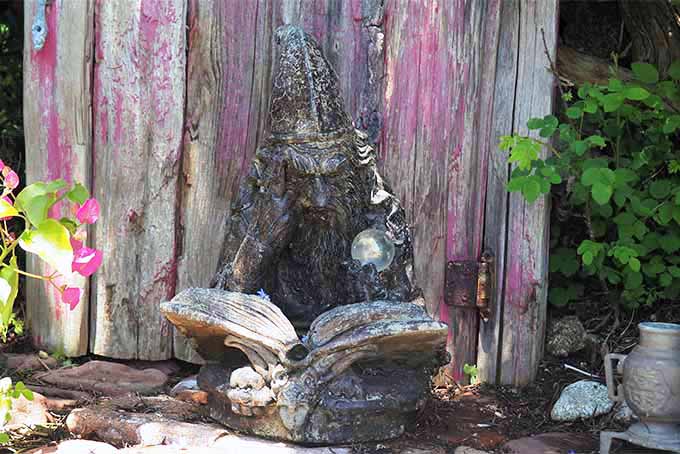
Just for a little while, become a Luddite – leave the phone indoors, take out the earbuds, and enjoy a break from emails, texts, phone calls, social media, and the web.
It’s the perfect environment to practice mindfulness. Indulge in the richness of the moment, and immerse your senses in all that’s available.
Simply pause, and become present. The sound of wind and birdsong, the color of leaves and blossoms, fragrances, the taste of herbs, and the texture of the earth will all mindfully absorb your attention.
Tuning in to what’s before us distracts us from our problems and puts us firmly on the pollen path of appreciation. The “pollen path” is a Navajo story about the riches of opportunity that await us when we journey through life with presence and appreciation.
This is a metaphor Joseph Campbell used often in his writings on mythology, which you can read more about in his collected works, The Inner Reaches Of Outer Space: Metaphor as Myth and as Religion.
This classic look at mythology in the space age is available on Amazon.

The Inner Reaches of Outer Space
The cares and worries of the world will still be there when you return to it, but the practice of mindfulness will let you see them in a gentler light, and with improved problem-solving skills.
There’s a wealth of information on the benefits of developing a state of mindfulness, and meta-analysis of the available data include the following:
- Reduced rumination (excessive worry over a perceived problem)
- Increased working memory capacity
- Stress reduction
- Improved ability to focus attention and suppress distracting information
- Decrease in emotional reactivity
- Increase in the ability to disengage from emotional upsets
- Improvement in relationship satisfaction
And because many tasks in the garden are rhythmic in nature, they naturally lend themselves to developing present moment awareness.
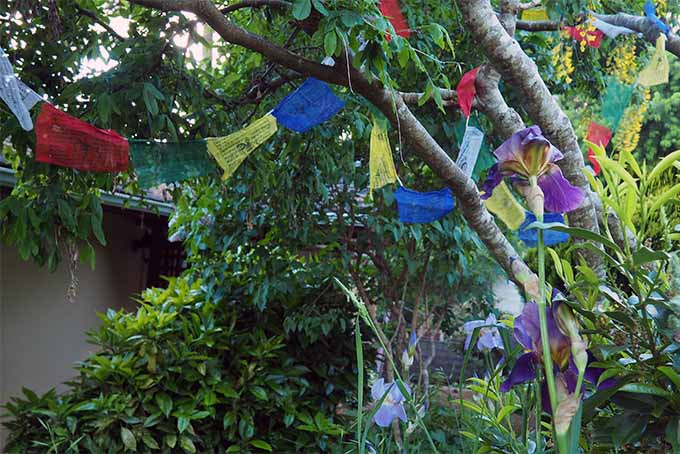
Repetitive motions such as hoeing, raking, weeding, and digging are soothing to the sympathetic nervous system (SNS), which is responsible for the “fight or flight” response. Too much stress, and this SNS is always “on” – which, of course, makes us feel even more stressed about feeling stressed!
These repetitive movements activate the calming “rest and digest” mode of the parasympathetic nervous system (PNS), and can easily be blended with positive affirmations, prayer, or mantras for even deeper levels of calmness.
Plus, any outdoor environment you tend can also become a habitat for wildlife, such as birds, butterflies, bees, and toads. This additional presence adds an even richer dimension of sensual appreciation to capture and hold your attention.
I Dig Love
George Harrison was an avid gardener, and the title to his track “I Dig Love” is a self-evident axiom to fellow diggers.
Nature is entirely non-judgmental, and the garden is beneficent – it accepts all those who enter.
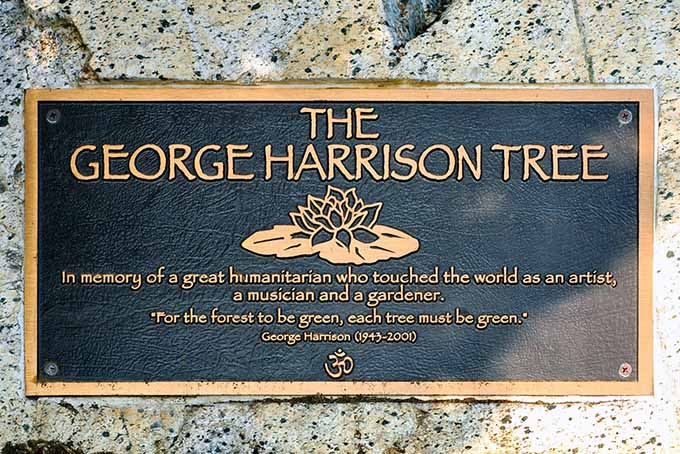
Regardless of age, size, color, nationality, or past mistakes, the welcome mat is out and everyone can avail themselves of the opportunity to be nurturers, flaws and all.
This all-embracing aspect is now being utilized in many therapeutic areas under the umbrella of horticulture therapy (HT). It provides a restorative environment and is showing wonderful results in promoting healing on all levels – mind, body, and spirit.
For example, pilot projects have shown that the changeless nature of gardening (the processes, not the vegetation itself), assists young offenders in developing much needed pro-social skills.
And as a tool in the treatment of post-traumatic stress disorder (PTSD), tending an allotment helps participants to develop the ability to differentiate between hostile and safe environments.
The benefits of HT continue to grow in magnitude, and it is now being applied in institutional settings such as prisons and geriatric care, and for the treatment of a variety of ailments, ranging from autism to cancer to eating disorders to dementia.
Additionally, this unconditional acceptance of the gardener is transformative, and boosts self-esteem. Whether you’re hurting from a minor bout of self-doubt or from significant trauma, gardening delivers a sense of accomplishment and fulfillment.
The results of the time and effort spent tending a plot are evident in the results we get. Whether it’s a bouquet of fresh flowers or your first homegrown salad, the fruit of your labors is tangible – proof of your wisely invested time.
Hidden Treasures
One of the most convincing pieces of evidence that gardening reduces stress comes on the heels of the discovery of the bacteria Mycobacterium vaccae.
Discovered in Uganda by immunologists in the 1990s, it turns out that the bacteria living in the lakeshore soil had immune-boosting properties. In 2004, studies concluded that M. vaccae didn’t actually prolong the lifespan of lung cancer patients – but it did improve their emotional health.
One of the most convincing pieces of evidence that gardening reduces stress comes on the heels of the discovery of the bacteria Mycobacterium vaccae…
Following on this, research on laboratory mice determined that immunization with M. vaccae improved stress resistance. Researchers found increased levels of serotonin in the prefrontal cortex, with a corresponding reduction in anxiety and fear behaviors, stress-induced colitis, and chronic low-level inflammation.
And how does this relate to gardening?
The “hygiene hypothesis” suggests that our overly sterile, antibiotic indulgent, urban lifestyles result in a lack of exposure to friendly bacteria – the good bugs that help to regulate our immune systems.
Research suggests the results of this sanitized environment are the burgeoning of a multitude of inflammatory diseases, including psychiatric disorders.

The good news is that M. vaccae is profusely abundant in rich, healthy soil. And, like all bacteria, it enters our physiology by landing on our skin, via ingestion, through cuts, and by inhalation.
Digging in the soil is a top-notch way to benefit from these happiness-inducing bacteria, but you don’t even have to do that.
A walk through the woods is enough to stir up the soil and release the bacteria for inhalation – which helps to explain why the Japanese government added “forest bathing” to their national health program in the early 1980s.
Japanese researchers have found that after a 30-minute forest bath (a.k.a. a stroll in the woods), the physiological effects included lower levels of cortisol, lower pulse rates, lower blood pressure, plus improved parasympathetic nerve activity (PNS), while the sympathetic nerve activity (SNS) was also lower.
Happy Hormones en Plein Air
We all know that the simple act of getting outdoors for fresh air and sunshine feels good. And when you factor in the perks of the light to moderate exercise that horticulture requires, those benefits increase even more.
Getting out into the sunshine for just 15 to 20 minutes a couple of times a week will help to boost vitamin D levels.
And as approximately 75 percent of American teens and adults are deficient in the sunshine vitamin, a deficit which is now suspected to increase incidents of cardiovascular disease and cancer, gardening offers a great way to naturally boost D levels.
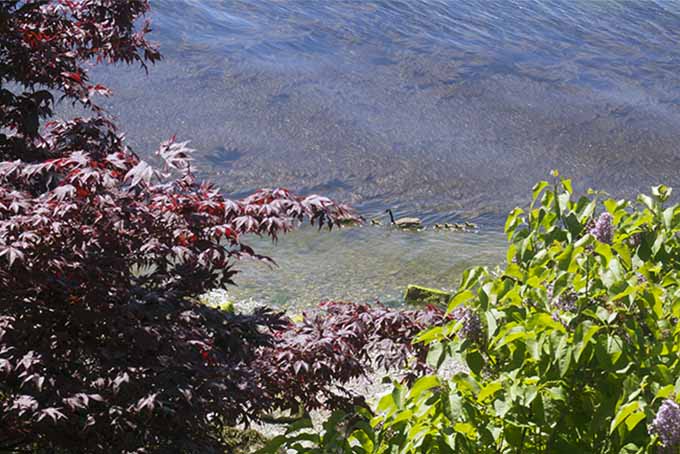
Plus, exercise increases serotonin and dopamine levels. Serotonin is known to help stabilize emotions, as well as helping with sleep and digestion. And dopamine is a neurotransmitter that mediates pleasure signals in the brain.
Not only does exercise boost serotonin and dopamine, it also decreases the stress hormone cortisol. As a result, we can’t help but feel better!
One study found that after just 30 minutes of gardening, cortisol levels dropped, and mood assessments improved – with fully restored feelings of well-being still present during the recovery period.
Blame It on the Weeds
Now, to be clear, gardening isn’t all sweet perfume and enchanting light – there are all those darned weeds, after all.
But they can serve the purpose of promoting calmness as well. Especially when you’re really bent out of shape and angry.
So, the next time you’re fuming mad about something, redirect your rage to blame it on the weeds and unleash your fury on them!
So, the next time you’re fuming mad about something, redirect your rage to blame it on the weeds and unleash your fury on them!
I know, I know – it’s not very Zen. But taking out a machete and whacking down a stand of invasive blackberries or encroaching ivy is a great way to vent anger and frustration.
If you’re not blind with rage, but just kind of mad, a less aggressive approach is to prune, snip, yank, saw, or chop until your feelings improve. And it’s certainly a better alternative than yelling at the kids – which always results in guilt, and naturally, more stress!
And, as the weeds always seem to grow back healthier than ever, maybe it is Zen after all…
The Pollen Path
As we’ve seen from this small sampling, there’s plenty of scientific proof to substantiate gardeners’ claims of the beneficial effects of horticulture.
We know that tending plants eases stress, anxiety, sadness, and fears by reducing cortisol levels and increasing serotonin. It engages our attention, regulates emotions, aids in the development of coping skills, and allows each and every one of us to be a nurturer.
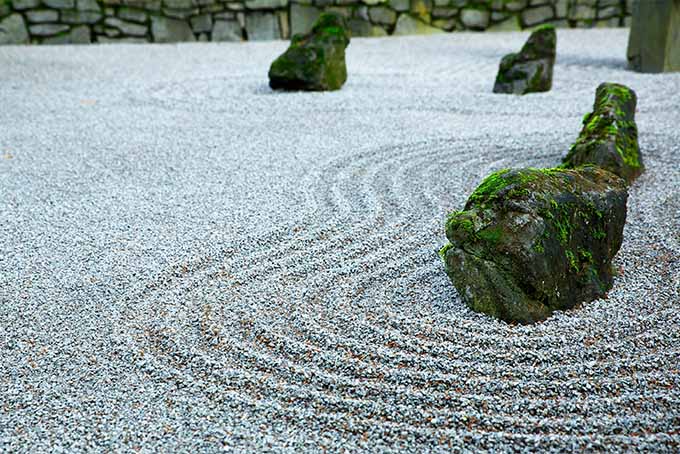
In the garden, we are indeed on the pollen path!
Even if you don’t have the space, time, or energy for a large plot, a few containers on the balcony will work – and community gardens are a great option for apartment dwellers.
Remember to keep your ambitions realistic so the practice stays enjoyable, and be sure to avail yourself of the knowledge and camaraderie available in community garden clubs, online forums, and of course, sites like Gardener’s Path!
Do you folks have anything you’d like to add to our stress-busting suggestions? Let us know in the comments below!
Photos by Lorna Kring, © Ask the Experts, LLC. ALL RIGHTS RESERVED. See our TOS for more details. Uncredited photos: Shutterstock.
